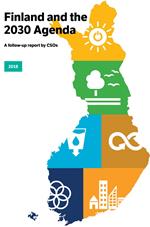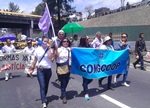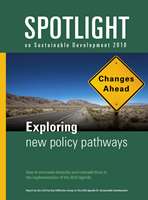Published on Mon, 2018-10-22 12:09
KEPA; the Finnish platform of civil society organizations, worries about the extraterritorial impact of Finland's production and consumption patterns. “Almost half of Finland's water footprint is caused by production chains outside Finland” they argue as an example. Kepa reports that “there is no reliable or even partially comprehensive information available in Finland on the external impacts of Finnish consumption, i.e., how we exploit natural resources outside of our own country”. The Finnish Ministry of Finance initiated an assessment of the national budget from a sustainable development perspective. However, the initial work is judged “quite modest”. The budget proposal for 2019 is going to be estimated mainly from the climate change perspective, and will focus on the plans for Finland to become carbon neutral after having reached a historic high in carbon emissions in 2017. Kepa considers it “necessary to widen the approach of taking sustainable development into account in the budget planning” to cover other issues and “to look courageously at tax support for fossil fuels and other activities that may even conflict with sustainable development.” |
Published on Mon, 2018-10-22 12:06
In Guatemala the main complaint about the State is its absence. “We have the sensation that there is no government,” reports Helmer Velazquez, director of the cooperatives and NGOs association Congcoop, “because taxes are so low and the 'state captors' don't even pay them, thanks to tax exemptions or plain avoidance, which leaves the exploitation of natural resources as the only funding source.” “This wouldn't be a problem if we didn't have seven million people living in poverty: Half of the population! And poverty is extreme for three million of them. Very calm, the government reported in 2017 ‘institutional progress’ by linking the SDGs with the national development plan K'atun 2032. In substantive terms, nothing.” |
Published on Mon, 2018-10-22 11:56
There is no doubt that social protection is a key instrument to end poverty and to give people access to opportunities for a self-determined life in dignity. National social protection systems can also contribute to achieving other SDGs, including food security, good health, decent work, gender equality, reduced inequality and cohesive communities. Even for countries that have the political will to close the gap and the organizational capacity to implement the required policies, a major challenge is to mobilize and maintain the necessary resources to cover the cost in a sustainable way. Social protection spending is not a short-term effort but needs to be planned and guaranteed for the indefinite future. |
Published on Fri, 2018-10-19 18:32
Worldwide, more than half of the global population is not covered under any type of social protection scheme, and less than 30 per cent enjoys comprehensive social protection. Women are particularly disadvantaged in social protection systems, experiencing lower coverage rates and substantially lower benefit levels. This is due, in part, to the fact that social protection schemes have often been designed around a male breadwinner model, assuming an uninterrupted and full-time career in the formal economy. This tends to penalise women – who are significantly underrepresented in the formal labour market, over represented in informal employment, earn less than men, and experience greater interruptions in their careers due to caring responsibilities. As a result, women are often excluded from contribution-based schemes and leaving them completely unprotected in the absence of social protection floors. This brief by ITUC explores the policies that have been shown to be helpful in reducing gender gaps in social protection: which include measures to reduce barriers to women’s labour market participation, measures to tackle the gender pay gap, supporting the transition to the formal economy, crediting periods of care in social security contributions, and guaranteeing adequate, universal social protection floors. |
Published on Fri, 2018-10-19 18:20
A crisis in "multilateralism for trade" has been unfolding in the two years since the fourteenth ministerial meeting of the United Nations Conference on Trade and Development (UNCTAD), the head of the organisation, Dr Mukhisa Kituyi, has said. "One of the casualties appears to be progress at the WTO," he added. This came at a meeting of UNCTAD's Trade and Development Board (TDB) on 1 October, where Dr Kituyi, the Secretary-General of UNCTAD, presented the mid-term review report on the implementation of the Nairobi Maafikiano, the mandate that UNCTAD was given at UNCTAD-14 which took place in Nairobi, Kenya in July 2016. |
SUSCRIBE TO OUR NEWSLETTER







